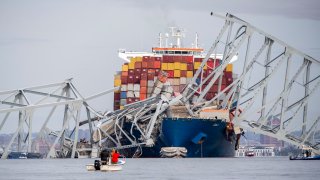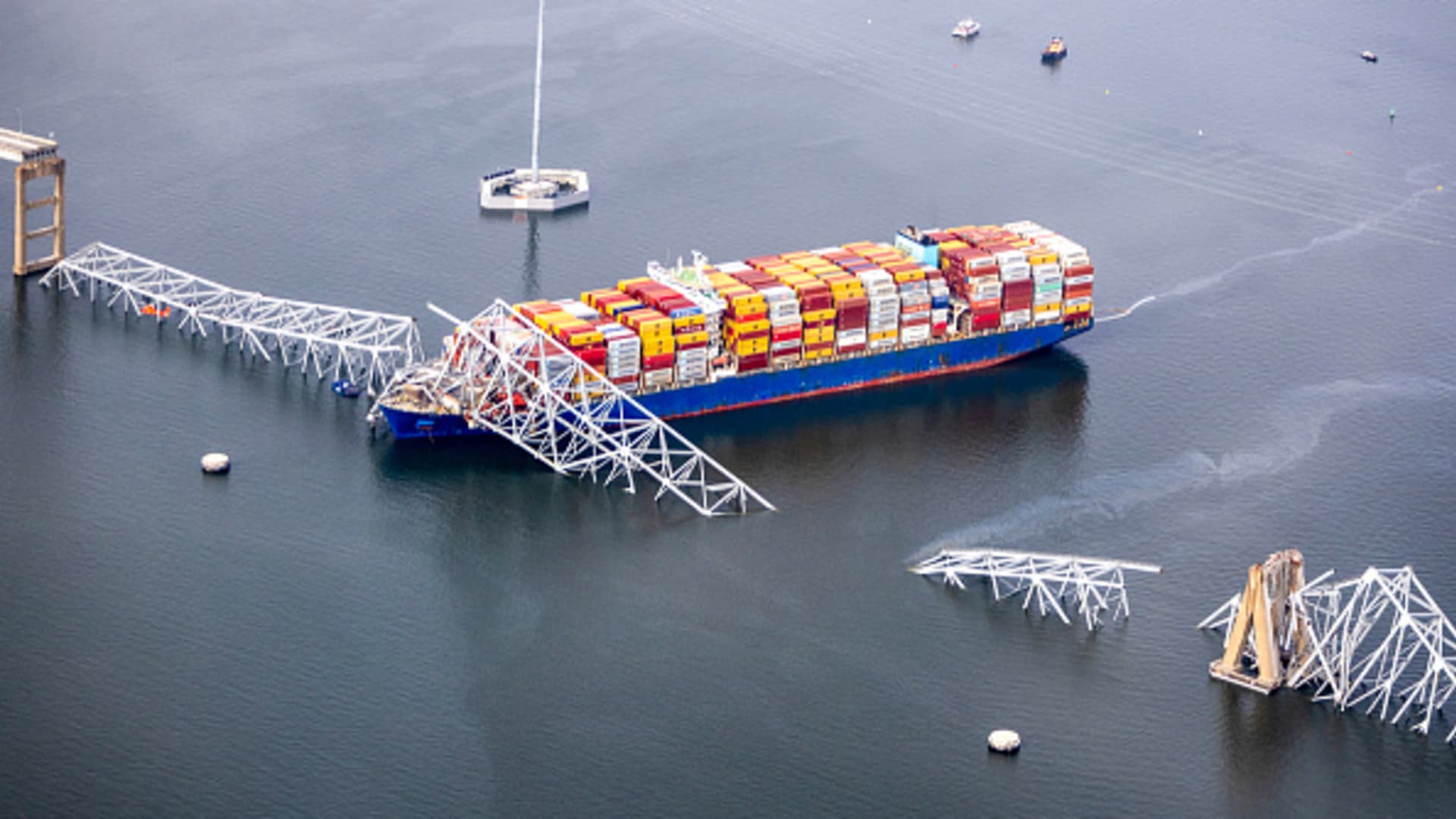
- The Baltimore bridge collapse has wreaked havoc at one of the country's busiest ports and raised questions about the Singapore-flagged container ship involved in the incident.
- Maryland Governor Wes Moore on Tuesday said the crew of the Dali was able to send a critical emergency alert that enabled authorities to clear the bridge of further car traffic ahead of impact.
- The container ship had previously been involved in a minor incident in Belgium's Port of Antwerp.
Six construction workers were presumed dead on Wednesday after a massive cargo ship struck the Francis Scott Key Bridge in Baltimore, causing it to partially collapse into the Patapsco River.
The incident, which has wreaked havoc at one of the country's busiest ports and sparked fears about supply chain disruption, has raised questions about the Singapore-flagged container ship involved.
Known as the Dali, the nearly 1,000-foot-long vessel was heading out of Baltimore Harbor and bound for Sri Lanka, when it hit a support pylon of the bridge at around 1:30 a.m. ET.
Get top local stories in Connecticut delivered to you every morning. >Sign up for NBC Connecticut's News Headlines newsletter.
It appeared to be traveling at roughly 8 knots (about 9 mph) before the collision, according to LSEG shipping data. Video footage of the disaster appears to show the 1.6-mile structure crumpling into the icy water almost immediately after it was struck.
A search and rescue effort was suspended Tuesday evening.
Money Report
Maryland Gov. Wes Moore on Tuesday said the crew of the Dali was able to send a critical emergency alert that enabled authorities to clear the bridge of further car traffic ahead of impact.
"Between the mayday and the collapse that we … that we had officials that were able to … to begin to stop the flow of traffic, so more cars would not end up on the bridge, which saved lives in a very, very heroic way," Moore said at a news conference.
Moore said the ship's crew notified authorities of power issues prior to the collision and that a preliminary investigation pointed to an accident.
What do we know about the Dali?
The Dali was previously involved in a minor incident in Belgium's Port of Antwerp, the second-largest port in Europe.
The ship suffered "sufficient damages" in July 2016 when it struck the stone wall of the quay during unmooring maneuvers, according to shipping trafficking website Vesselfinder.
The accident, which did not cause any injuries, occurred during good weather and "was caused by the mistake of the Master and pilot on board." The Dali remained afloat after the incident and was subsequently repaired.
Separately, an inspection of the Dali in San Antonio, Chile, in June last year found propulsion and auxiliary machinery deficiencies, NBC News reported Tuesday, citing data from the website Equasis, which provides information on ships.

However, Singapore's port authority on Wednesday said that the container ship had passed overseas inspections and carried certificates to cover its structural integrity and functionality at the time of the Baltimore bridge incident.
The Dali underwent and passed two separate foreign port state inspections in June and September last year, the authority said. In the June inspection, the container ship was found to have had a faulty monitor gauge for fuel pressure, but this was fixed before the vessel departed the port.
The Maritime and Port Authority of Singapore added that the Dali's next classification and statutory surveys had been scheduled for June 2024.
Who chartered the ship?
Danish shipping giant Maersk has confirmed it chartered the Dali, saying on Tuesday that it was "horrified" by what happened in Baltimore.
"Our thoughts are with all of those affected. We can confirm that the container vessel 'DALI', operated by charter vessel company Synergy Group, is time chartered by Maersk and is carrying Maersk customers' cargo," the company said in a statement.
"No Maersk crew and personnel were onboard the vessel. We are closely following the investigations conducted by authorities and Synergy, and we will do our utmost to keep our customers informed."
Since the Panama Canal was expanded in 2016, Baltimore's 50-foot shipping channel and port handle some of the world's largest cargo ships that arrive from Asia and elsewhere. The port handles goods including automotives, sugar, coal and machinery.
— CNBC's Ruxandra Iordache and Jenni Reid contributed to this story.






